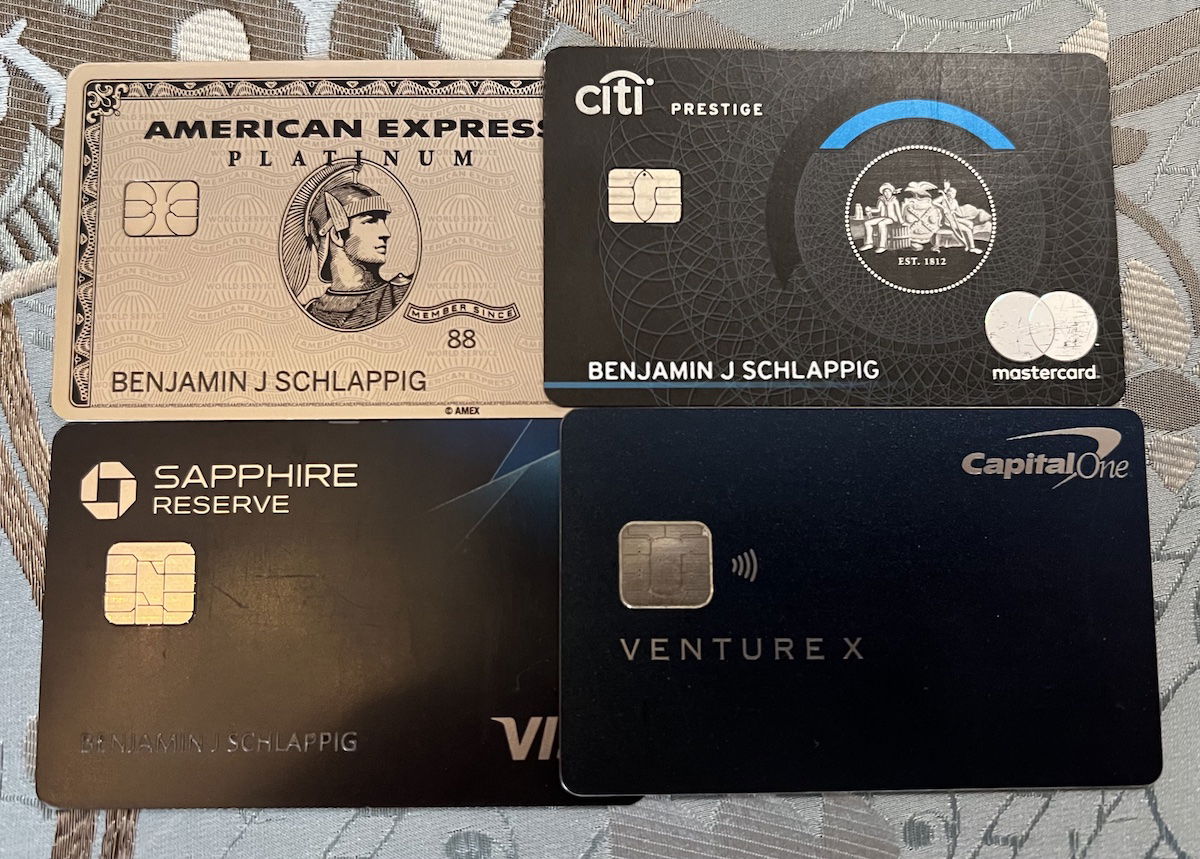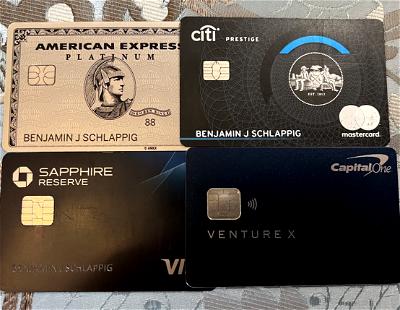Most people probably don’t look forward to paying their taxes. For those of us in the miles & points world, though, one silver lining is the potential to generate credit card spending at an attractive rate.
Personally I pay all of my estimated quarterly and annual taxes by credit card, so in this post I wanted to take a closer look at why. Long story short, the credit card rewards that you can generate by using a credit card can more than offset the fee of doing so.
In this post:
How much does it cost to pay taxes by credit card?
You can’t pay your federal taxes directly with the IRS by credit card, but rather there are three services that facilitate this. For the record, this is officially approved by the IRS, so this isn’t some shady operation. Here are the three options, along with their fees for credit card payments:
- payUSAtax.com — 1.82%
- Pay1040.com — 1.87%
- ACI Payments, Inc. — 1.98%
While the exact types of cards accepted differ somewhat between the services, all of them accept American Express, Mastercard, and Visa payments.
Also note that the above fees are for paying federal income taxes, whether year-end or quarterly. If you’re paying state or local taxes (including property taxes), there may be opportunities to pay by credit card directly online. However, the fees will differ, and the above services can’t be used for that.

What are the logistics of paying taxes by credit card?
Of course everyone is in a different situation when it comes to how much they owe in taxes, and what their credit limits are on cards. Some people with big tax bills might be in a position where what they owe is significantly more than the credit limit on their card. So how does that work?
The IRS officially claims that you’re allowed to make two credit card payments per payment period. However, anecdotally speaking, the limit seems to be two credit card payments per payment processor per tax period. Since there are three services, you can potentially make six payments per payment period by credit card. If you pay quarterly taxes, this means you could potentially make a couple of dozen payments per year by credit card.
At least that’s how I (and many others) have been doing it for years without issue. You always provide your social security number when making a payment, and the IRS lets you track payments received based on that. I’ve never had an issue with them not showing up correctly.
When is paying taxes by credit card worth it?
If you’re a savvy credit card user who pays taxes directly to the IRS, then paying your taxes by credit card should be a no-brainer. This is a great opportunity to generate credit card spending at the reasonable cost of just a 1.82% convenience fee.
Before I talk about the exact situations under which this makes sense, let me emphasize a couple of points:
- You shouldn’t pay taxes by credit card if you’re not actually good at maximizing credit card rewards, and if you’re not earning rewards that exceed the cost of the fees; you’ll want at least a calculated return of 2%, and ideally more
- You shouldn’t pay taxes by credit card if you can’t use credit cards responsibly, and are going to end up financing your tax payments using high credit card interest rates
With that in mind, under what circumstances does it make sense to pay your taxes by credit card, while paying a fee of 1.82-1.98%? In no particular order…
Credit cards with a great return on spending
The credit card landscape is incredibly competitive nowadays, and credit card rewards structures have improved considerably. If you’re using one of the best cards for everyday spending, you should easily be able to get value that exceeds the 1.82-1.98% fee.
For example, there are several cards that potentially earn up to 2x transferable points per dollar spent, including the following:
- Capital One Venture X Rewards Credit Card (review) (Rates & Fees)
- Capital One Venture Rewards Credit Card (review) (Rates & Fees)
- Citi Double Cash® Card (review)
- The Blue Business® Plus Credit Card from American Express (review)
- Capital One Venture X Business (review) (Rates & Fees)
- Capital One Spark Miles for Business (review) (Rates & Fees)
I value all these points currencies at 1.7 cents each, meaning that to me that’s the equivalent of a 3.4% return on spending. This is essentially a way to acquire transferable points for under a cent each, which I think most would agree represents a good value. I’d buy transferable points all day long at under one cent each if I could.
Let me also emphasize that above I’m including both personal and business cards that earn 2x transferable points. However, keep in mind that you should typically not use business cards for personal spending. However, I’m trying to be thorough in terms of the return on spending offered by various cards.
As you can see above, you can even come out marginally ahead by using a good cash back card, which earns a 2%+ return on spending. A 2% return on spending probably isn’t worth the hassle factor, but in some cases you can do even better than that.

Meet credit card minimum spending requirements
There are some amazing credit card welcome bonuses out there, which generally require you to spend a certain amount within a defined period. Sometimes the spending requirements might be more than you’d otherwise ordinarily spend, especially if there’s a huge bonus with a significant spending requirement.
Paying taxes at a reasonable fee of 1.82-1.98% is a great way to generate credit card spending for these purposes.
Credit cards with spending or threshold bonuses
In addition to the cards with a generally lucrative return on everyday spending, there are also cards with specific threshold spending bonuses, which are particularly lucrative.
For example, the World of Hyatt Credit Card (review) has a $15,000 annual spending sweet spot, if you ask me. If you put a $15,000 payment on the card for a 1.82% fee (~$273), you’d earn 15,000 World of Hyatt points, a Category 1-4 free night award, and an incremental six World of Hyatt elite nights. That’s a pretty great value.
Similarly, the Hilton Honors American Express Surpass® Card (review) offers a free night award when you spend at least $15,000 on the card in a calendar year. So not only would you earn 45,000 Hilton Honors points for spending $15,000, but you’d also earn a free night award valid at a property costing up to 150,000 Hilton Honors points. That’s incredible.

Credit cards with airline & hotel elite status opportunities
There are more opportunities than ever before to earn airline and hotel loyalty program elite status through credit card spending.
For example, American AAdvantage status is based on earning Loyalty Points, so you can qualify for elite status through credit card spending. Spending $180,000 on the Citi® / AAdvantage® Executive World Elite Mastercard® (review) would earn you American’s top tier Executive Platinum status (you need 200,000 Loyalty Points, and the card offers an annual Loyalty Points bonus of up to 20,000 points).
Now, is this worth earning exclusively through credit card spending? No, probably not. But at the margins it can be worth it, and at the rate of 1.82-1.98%, that’s pretty attractive pricing.
To give a hotel example, the IHG One Rewards Premier Credit Card (review) offers IHG One Rewards Diamond status if you spend $40,000 on the card in a calendar year. If you spent $40,000 on taxes with a 1.82% fee, you’d be paying an extra $728. For that you’d receive the following:
- 120,000 IHG One Rewards points (the card earns 3x points)
- A $100 statement credit and an additional 10,000 points (the card offers this when spending $20,000 per calendar year, plus making one additional purchase)
- IHG One Rewards Diamond status
I’d say that very much has the potential to be worthwhile as well.

Credit cards with low-interest opportunities
In general I advise against financing charges on your credit card, given how high interests rates can be. However, we do sometimes see promotional low or no interest rate opportunities on a credit card. If you’re in a cash crunch and being able to finance these charges for some amount of time would be helpful, this could give you some extra time. Again, I’d avoid this if at all possible, but I do think it’s worth acknowledging.
Bottom line
I’ve been paying my taxes by credit card for many years, and find it to be an excellent value. Being able to generate credit card spending for a fee of under 2% is a no-brainer, in my opinion. It’s an easy opportunity to reach minimum spending, it’s a great way to acquire transferable points for under one cent each, and it’s also the easiest way to meet spending threshold bonuses or earn elite status.
Personally my default is using a card earning 2x transferable points, though I’ll also often use this opportunity to reach minimum spending requirements on cards.
Do you pay taxes by credit card, and if so, what’s your strategy for deciding which card to use?





I wish I could know this sooner but better late than never. Thanks, Ben...great article. I will pay tax on my Hyatt Credit Card going forward.
@Ben
My wife and I own an S-Corp so our business and personal taxes are combined. We’ve got an upcoming tax payment in the six figure range. I’d love to pay on our Venture X Business but this is technically a personal tax payment. Short of splitting the payment amongst a litany of cards, what personal card are you aware of that might make sense? No personal charge cards earn more than 2x (that...
@Ben
My wife and I own an S-Corp so our business and personal taxes are combined. We’ve got an upcoming tax payment in the six figure range. I’d love to pay on our Venture X Business but this is technically a personal tax payment. Short of splitting the payment amongst a litany of cards, what personal card are you aware of that might make sense? No personal charge cards earn more than 2x (that I know of). And I’m pretty sure that despite my 800+ credit score, no new card you listed is going to offer me a six figure line of credit. I’d love to put $125k on an AA credit card towards Exec Plat. but surely no way I’m getting the credit line there either. Any ideas? Thanks so much
I did this during the pandemic because AA allowed the miles to count towards Million Miler Status. It helped get me to 2 million miles and Lifetime Platinum status...
Is this allowed, to intentionally overpay on estimated tax payments have it all refunded back? For instance if I were to owe 5k otherwise in my tax return and use estimated tax to put in 50k paid by credit card, will there be any issues in receiving the 45k tax "refund"?
Depending on when you make an estimated tax payment, that money would be "gone" until you're able to file that year's tax return and get your refund. If having your money gone for that long isn't a problem, then it's an interesting idea!
I'd love to hear from a tax person if there's a way to get an estimated tax "overpayment" back sooner than that.
If you're an individual, nope. Your payment is on deposit (interest free) until you file a tax return.
I used the PayUSATax service for meeting new card spend requirements, so I figure this cost into the cost of the points - my true valuation - although I love to brag about the Paid ticket price divided by award miles needed ;-)
I ran $20,000 thru the IRS and just got the refund posted to my Checking account. Sweet!
I Have had trouble using a chase card any idea why it doesn't work.
Chase says it never shows up as trying to process seems like it's something on the IRS end
Great article, Ben.
Can you or other commentators (with full understanding that nothing should be taken as tax advice and we should consult our own tax experts for such guidance) on the deductability of the 1.87% transaction fee itself as a business expense? That would certainly increase the value proposition even further!
Tax guy here. If your income tax liability is attributable to a business run through Schedule C, K-1, etc., then you have an argument that the transaction fee is at least partially deductible. If it's entirely W-2 or investment income, then no. Same with annual fees on the underlying card itself. You'll need to talk to your CPA for your specific situation, but hopefully that helps you formulate the questions you'll need to ask.
Dear Ben My wife and I are looking to buy a new car cash but would like to buy with CC giving points and pay off at first statement so we don't Pay interest. Any thoughts or stratagies?
Most car dealers won’t allow you to put more than $5,000 on a card due to the processing fees. But something is better than nothing.
I successfully purchased a $30K+ car last year in NM using 2 Amex cards. You just have to find a dealer willing to do the deal & negotiate it beforehand.
I've purchased two cars from the same dealership and they allowed me to put $10,000 each time on my DL Skymiles AMEX card. A number of years ago I was buying a new car for my teen son and wanted to put $5000 on a card that earned Norwegian Cruise Line points. They said no way so I got up and walked out. They chased me down in the parking lot to tell me they would work it out, lol.
True, but what could also be done in addition to that is, to pay for all the extras like prepaid service contract etc SEPARATELY - again with a credit card.
I haven’t found any payment method to use Apple Pay. I’m thinking about my USbank reserve card?